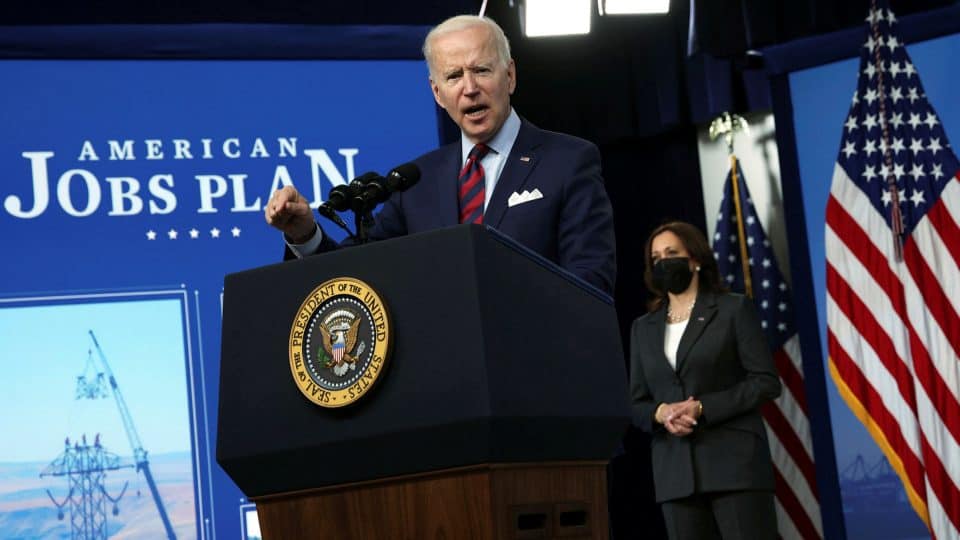This article was originally published on Merionwest.com
“THE RECOVERY ITSELF IS LIKELY TO BE THE LARGEST JOB CREATOR THIS DECADE.”
Debate over the Biden administration’s infrastructure bill is heating up. However, much of the discussion centers on how the infrastructure spending will be financed instead of the proposed spending itself. The main issue is how the financing for this plan will position the country as it continues its economic recovery after the pandemic. How could paying for the plan increase or hinder social mobility, and how might the tax proposals position the United States compared to other countries?
Social mobility is the defining issue of our time, and there are many policy tools for alleviating poverty. The policy focus of our post-pandemic world should recognize that the best and most important way to climb the income ladder is through a job. Much of the policy focus during the pandemic has been on softening the blow from lockdowns and the corresponding lack of economic activity. However, these policies should be more like trampolines instead of mattresses. Smart policy can serve the valuable purpose of alleviating poverty, but programs designed to manage poverty are distinct from those aimed at boosting social mobility.
It is important to remember that the Coronavirus (COVID-19) pandemic has been a health crisis that triggered a short-term economic crisis. Before the pandemic hit, unemployment numbers were at an all-time low, and the economy showed strong—albeit not spectacular—growth. Many of the previous administration’s tax policies were still being tested, and their impacts were still not entirely clear. But there were certainly promising signs. New proposals should take care not to undo the successes from before the pandemic.
Job creation and economic growth enable social mobility and create more opportunities for people to climb the income ladder. Therefore, tax proposals to fund infrastructure spending should steer clear from those that would hinder the economic recovery and reduce the number of jobs available.
Overall, in countries like those in Scandinavia that have more social mobility and less inequality, corporate tax rates are kept in the low 20s because it is understood that job creation is key to a prospering society and that a well-designed tax system plays an important role in that equation.
According to the Tax Foundation’s calculations, higher corporate tax rates and other tax increases proposed by the Biden administration, such as raising capital gains tax or increasing the burden on the global success of companies, would ultimately impact job creation.
Academic studies do not always agree on the specifics, but it is clear that though these tax increases are designed to target corporations and wealthier segments of our society, the costs often end up being passed through to consumers or employees, who experience higher prices or reduced wages.
Current businesses and investments would face the proposed tax hikes. But they would not be the only victims of these proposals. The tax hikes would also be a burden on new businesses and new opportunities for hiring and bringing more people onto the ladder of social mobility.
Additionally, if we increase the tax burden on American businesses and investment too much, the United States would be at an economic disadvantage compared to other countries. To reduce this disadvantage, the administration has also proposed a global agreement on corporate taxes so that other countries are also affected. However, that would reduce economic dynamism across the world and end up hurting the most vulnerable among us.
The administration claims that the programs proposed will lead to more job creation over the long term, to the tune of almost 20 million new jobs in the coming decade. However, without any policy changes, much of the pre-pandemic job growth would likely resume as the country continues to win its battle with COVID-19. The recovery itself is likely to be the largest job creator this decade.
The question that the administration needs to answer is not just what its policies will do; it is what they will prevent from happening—the job opportunities that will never be created and the steps up the income ladder some workers will not get to take. The business that is unable to finance an expansion because of higher taxes is not counted as reducing employment, but fewer people are hired, nevertheless.
Ultimately, economic growth, social mobility, and improving on what was done in the previous administration should be the focus for an administration whose promise was to “build back better.” Hamstringing the ongoing economic recovery would be a major step back in addressing inequality of opportunity and helping those who were most affected by the pandemic.
Gonzalo Schwarz is the CEO of the Archbridge Institute and Daniel Bunn is Vice President of Global Projects at the Tax Foundation.


